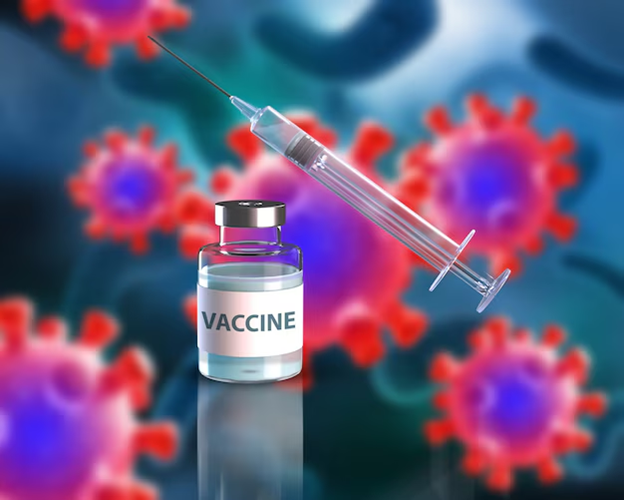




Complete Guidance On What Is DPT and Why is it Important
DPT stands for Diphtheria, Pertussis, and Tetanus vaccine, which provides protection against three serious bacterial infections.
Get here more Insights into the importance, dosage, benefits, and possible side effects of the DPT vaccine.

What is the DPT Vaccine and Why is it Important?
The DPT vaccine is a combination vaccine that provides immunity against diphtheria, pertussis (whooping cough), and tetanus.
Diphtheria: A bacterial infection affecting the throat and airways, potentially fatal if untreated.
Pertussis: Also known as whooping cough, a severe respiratory disease causing uncontrollable coughing fits.
Tetanus: A life-threatening bacterial infection affecting the nervous system, often caused by contaminated wounds.
Essential for infants and adults as part of routine immunisation programs.
Site Of Administering DPT Vaccine
The DPT vaccine is administered as a deep intramuscular injection. It can also be given in the upper outer quadrant of the gluteal region.
According to the 1984 Global Advisory Group, the preferred site for children under one year is the lateral aspect of the thigh.
DPT Vaccine Dosage and Schedule
The DPT vaccination schedule ensures long-term immunity and disease prevention.
Recommended Dosage:
Infants (Primary Series): Three doses at 6, 10, and 14 weeks of age.
First Booster Dose: Given at 16-24 months to strengthen immunity.
Second Booster Dose: Administered at 4-6 years of age.
Adult Boosters (Tdap/Td Vaccine): Every 10 years for continued protection.
Benefits of the DPT Vaccine
The DPT vaccine plays a crucial role in disease prevention and public health protection.
Prevents three deadly infections: Offers lifelong protection against diphtheria, pertussis, and tetanus.
Reduces infant mortality rates: Helps protect newborns and young children from serious complications.
Boosts community immunity: Widespread vaccination prevents disease outbreaks.
Minimises risk of severe complications: Reduces hospitalisation and medical costs.
Possible Side Effects of the DPT Vaccine
Like any vaccine, DPT may cause mild to moderate side effects, but serious reactions are rare.
Common Side Effects:
Mild fever, redness, or swelling at the injection site.
Temporary fatigue, fussiness, or mild headache.
Loss of appetite for a short period.
Rare but Serious Side Effects:
High fever (above 102°F).
Severe allergic reactions (anaphylaxis).
Prolonged crying in infants (over 3 hours).
Note: Serious side effects are rare, and the benefits of vaccination far outweigh the risks.
Who Should Take the DPT Vaccine?
The DPT vaccine is recommended for infants, children, and adults to ensure lifelong protection.
Newborns and infants as part of routine immunisation.
Children under 6 years for primary and booster doses.
Adults requiring a tetanus booster after injuries.
Pregnant women to provide passive immunity to newborns.
Precautions Before Taking the DPT Vaccine
Certain precautions should be considered before taking the DPT vaccine.
Inform the doctor if the child had a severe allergic reaction to a previous vaccine dose.
Postpone vaccination if the child has a high fever or severe illness.
Consult a healthcare provider if the child has a history of seizures or neurological disorders.
Conclusion
The DPT vaccine is an essential immunisation that protects against diphtheria, pertussis, and tetanus, all of which can be life-threatening. Following the recommended vaccination schedule ensures long-term immunity and prevents disease outbreaks. The vaccine is safe, effective, and a crucial part of global immunisation programs. Getting vaccinated at the right time helps protect individuals and communities from these serious infections.
FAQs on DPT Full Form - Diphtheria, Pertussis, and Tetanus
1. What does DPT stand for?
DPT stands for Diphtheria, Pertussis, and Tetanus, a vaccine that protects against these bacterial infections.
2. How many doses of the DPT vaccine are required?
The primary series includes three doses at 6, 10, and 14 weeks, followed by booster doses at 16-24 months and 4-6 years.
3. Is the DPT vaccine safe?
Yes, the DPT vaccine is safe and effective, with mild side effects like fever or swelling at the injection site.
4. Can adults take the DPT vaccine?
Yes, adults can take Tdap or Td boosters every 10 years for continued protection.
5. What are the side effects of the DPT vaccine?
Common side effects include mild fever, pain, and redness at the injection site. Serious reactions are very rare.
6. Is the DPT vaccine mandatory for school admission?
Yes, most schools require proof of immunisation, including DPT, before admission.
7. Can a child get the DPT vaccine if they are sick?
If a child has a mild illness, vaccination can proceed. However, for high fever or severe illness, consult a doctor before vaccination.
8. What happens if a DPT dose is missed?
A missed dose should be taken as soon as possible to complete the schedule. Consult a doctor for catch-up vaccination.
9. Why is the DPT vaccine important for newborns?
Newborns are highly vulnerable to diphtheria, pertussis, and tetanus, making early immunisation crucial for protection.
10. Can the DPT vaccine cause allergic reactions?
Serious allergic reactions are extremely rare. Any severe reaction should be reported to a healthcare provider immediately.























